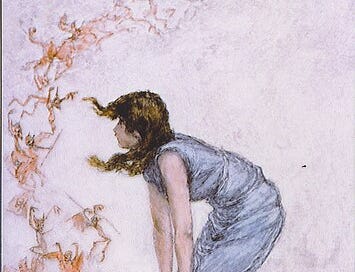I love a well-stocked bookcase. I love scanning the titles on the shelves to see what I can glean about the interests of the person who filled it. Some people’s shelves hold books on gardening, some numerous books of light fiction, others have a decidedly historical slant. The bookcase in our home when I was a child held a lot of books about religion. Devotionals, books about Christian historical figures and the like. But there was one book that seemed curiously out of place among the others, and it was the book that I gravitated to and spent hours poring over. It was an anthology of some sort and was a hefty tome, several inches thick and containing hundreds of slippery-thin pages. I don’t remember the exact contents, but I do know that there were several sections on mythology. I found these fascinating and disturbing in varying levels. Mythology is not a neat and tidy affair because the gods can be both benevolent and brutal.
One of the most mysterious to me was the story of Pandora. In this myth, Pandora is created as revenge on mankind (literally MANkind, as Pandora is the first woman) for having been given the gift of fire by Prometheus. The gods create this gorgeous woman and gift her grace and beauty and music and basically all creative good. She’s also gifted deceit and stubbornness because goodness knows men themselves would NEVER stoop to such tactics so it must be women’s fault. As a final gift Zeus gives her a box (literally a jar in Greek) and tells her never to open it which is a really crappy wedding gift if you ask me. Of course, Pandora does open it because she’s also been gifted with curiosity. In the words of Admiral Ackbar, “It’s a trap!” Out of the box fly all the things destined to torment humanity: greed, envy, poverty, war, famine, disease, and death. Stunned, Pandora slams the lid closed again, trapping hope inside.
This bothered me to no end as a child, and still does. No one really has a good answer for what it means that hope was left in the box. Does it mean that humanity is left without hope, since hope remains imprisoned? Does it mean that we DO have hope, since it wasn’t left to fly away? Mythology, like the gods themselves, can sometimes be inscrutable.
I wish for a better ending to the story of Pandora. It always ends with her sitting there with her box (or jar), stunned, frightened, overwhelmed by the enormity of what has just happened. I want to hear about her growing old, about how she raised her children and stood them in front of the box and told them the story of how they too would see evils in the world, but…wait…there is still something more! I want an ending for Pandora that makes her more than just an unwitting accessory, a dupe of the gods. I want a Pandora who has seen heartache and let it hone her into something fierce and brilliant, who spits in the face of the gods and reminds them that they may control chaos, but she controls hope.
I have searched and searched for the exact attribution of this piece. The best I can find is that it is an engraving based on a sketch by American artist Frederick Stuart Church. I’m fairly sure this is the image I saw as a child, the one that shaped my mental picture of the ‘ills’ as some sort of pointy, twisted little fairy-like creatures.




